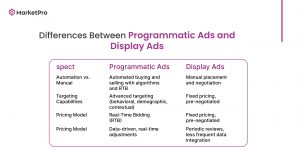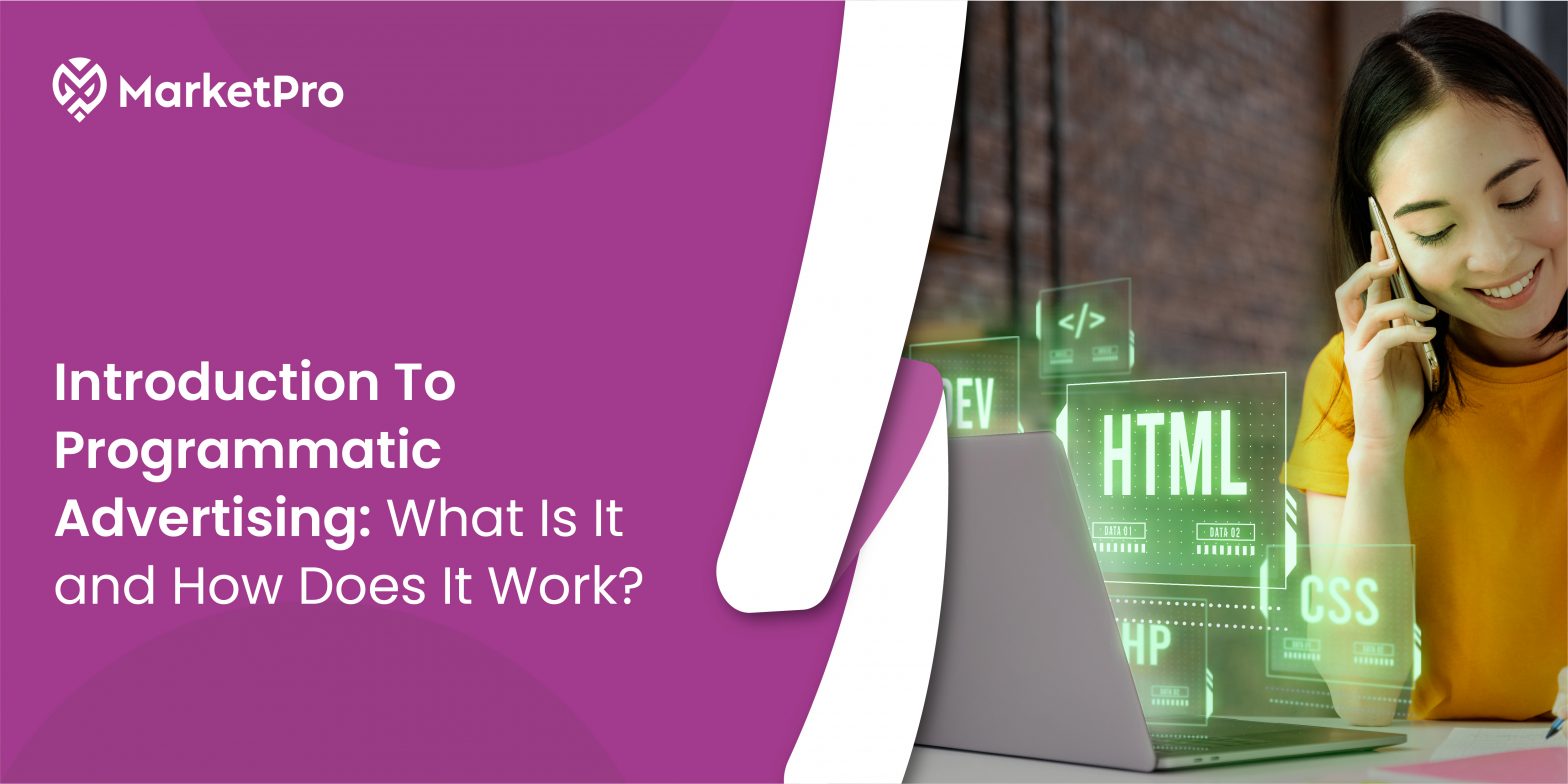In this digital world where the market is bombarded with so many brands, companies struggle with finding the right customers at the right time.
Through programmatic advertising, companies can utilize real-time bidding and data-driven insights to generate more leads thereby increasing their conversions.
The targeted ads feel more personalized to users, thereby enhancing brand awareness in the digital age. In 2023, global spending on programmatic ads reached an estimated 558 billion U.S. dollars. Projections indicate that by 2026, this figure will surpass 700 billion U.S. dollars, and many companies will hire programmatic advertising services.
But how does this new form of advertising revolutionize so many businesses? And more importantly, how can it help your business? We will explore this in this blog.
What is Programmatic Advertising?
Ever heard of buying and selling ad spaces online? According to Emarketer forecast, Programmatic display advertising is expected to make up 91% of US digital display advertising in 2024. But what are programmatic ads and why is are they so relevant now?
Programmatic digital advertising is an automated method of buying and selling online ad space. In it, marketers do not negotiate ad places. Rather, they use software to purchase digital advertising spaces.
This process utilizes algorithms and real-time data to target specific audiences, ensuring ads reach the right people at the right time.
However, this is just an overview of what a programmatic display advertisement is; the steps are not that simple. There are many steps involved in the process.
Suggested Read: Online Reputation Management Definition, Strategies, and Importance
How does Programmatic Advertising work?
Digital Programmatic advertising makes ad placements easy and much more efficient. But how can it be used to your advantage? Here is how.
- Setting the Right Campaign Goals: Define a target audience first. This can be young individuals who might be interested in a new product. Next, you need to set a budget for your campaign. You can use a programmatic platform to do that.
- Creating an Ad Inventory: The platform connects with multiple ad exchanges to access a wide range of websites and apps. This is where ads can appear. It can include various digital spaces frequented by the target audience.
- Real-Time Bidding: When a potential customer visits a highlighted website, an auction is carried out within milliseconds. The platform bids for the ad space based on the value of the visitor to the campaign. This ensures ads always compete for the best spots.
- Targeted Ad Placements: If the bid wins, the ad is instantly shown to the user. This process is completed before the website loads. This ensures that there is no lag between when the user opens the website and when they see the ad.
- Data Collection and Analysis: As the campaign runs, the programmatic digital advertising platform collects data on ad performance. It also tracks metrics like impressions, clicks, and conversions. This data reveals which ads resonate most with the audience.
- Continuous Optimization of Advertising: The platform runs in real-time. It collects data and automatically adjusts bids and targeting to improve performance. If certain websites or times of day yield better results, the platform shifts more of the budget to those areas.
Benefits of Programmatic Advertising?
Here are some benefits of programmatic ads for you to consider.
- Offers precise targeting: Marketers can now target specific audiences with greater precision. The platforms collect data and make constant shifts to find the ideal match for the ads.
- Ensures Real-Time optimization: Programmatic platforms continuously analyze campaign data. It also adjusts bids and targeting in real-time to improve performance. MediaRadar found out that programmatic ads increase ROI by 30%.
- Offers efficiency and automation: Marketers do not have to put in manual effort to negotiate and place ads. This gives them more time to plan and strategize. Additionally, this advertising also reduces time spent on administrative tasks.
- Ensures Cost-efficiency: Programmatic marketing often operates on a real-time bidding (RTB) model. This ensures that advertisers only pay for the impressions that are most valuable to them.
- Allows for greater Scalability: If you want to scale your campaigns across multiple channels like display ads, mobile ads, video ads, audio ads and social media without negotiating ads separately, programmatic ads is the solution for you.
Programmatic vs Display Ads
Back in 2018, businesses often relied on display ads for B2B branding. This involved manually purchasing digital ad spaces on specific websites without precise targeting. Popular tech blogs were selected in hopes that the targeted audience would read those blogs. However, the B2B PPC advertising strategy yielded minimal results. This led many to switch to programmatic advertising.

Programmatic ads automate the ad-buying process, using real-time data to target specific demographics and behaviors. These ads appear on various sites frequented by the target audience. It also optimizes placement and bids in real time. This ensures ads reach the right people at the right time. This, hence offers greater efficiency and effectiveness compared to traditional display ads.
How to Build a Successful Programmatic Advertising Strategy
Programmatic advertising holds immense potential, yet many are unaware of its capabilities. To implement this strategy effectively, consider the following steps:
- Defining Clear Objectives: The primary objective should be clearly defined. This can be an increase in website traffic by organic seo, ppc etc or boosted conversions. When you outline the goals clearly, it helps you compare different strategies against a set of criteria.
- Understanding Your Audience: Conduct thorough research to understand the target audience. For example, a tech firm might target young professionals interested in the latest gadgets. They might also segment them based on their online behavior.
- Choosing the Right Platform: You need to select the right programmatic platform is crucial for robust and efficient analytics. Some recommended platforms include The Trade Desk, Adobe Advertising Cloud, and Google Display Network.
- Setting Up Real-Time Bidding (RTB): Configure the platform to participate in real-time bidding by defining the bid strategy, budget, and ad placements. This ensures ads compete for the best positions while staying within budget.
- Creating Compelling Ad Creatives: Develop eye-catching ads tailored to the target audience. Do this by using impressive visuals and persuasive messaging to stand out from competitors and appeal to consumers.
- Implementing Data-Driven Targeting: Use A/B testing to determine the most effective strategies. Additionally, adopt advanced targeting options through the programmatic platform to reach the most relevant users.
- Monitoring and Optimizing in Real-Time: Continuously monitor performance metrics such as impressions, clicks, and conversions. Use these insights to adjust bids, targeting, and ad creatives in real-time, maximizing efficiency and effectiveness.
- Analyzing and Reporting: Generate detailed reports to understand which ads and strategies perform best. Use these insights to refine and build on successful tactics, ensuring continuous improvement.
Adopt the advanced Programmatic Advertising strategies with Marketpro
A good Programmatic advertising agency helps automates and optimizes the ad-buying process so you can achieve precise targeting. Backed by data-driven insights, it helps you reach the right audience at the right time. You can maximize your return on investment by achieving higher engagement and an even better conversion rate.
At Marketpro, we design your strategies by focusing on creativity and innovation. We will help you deploy programmatic advertising so you can not only save time and resources, but also scale your brand in less time.

